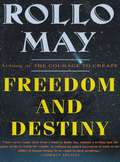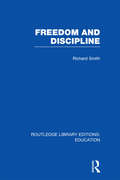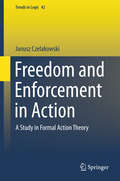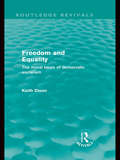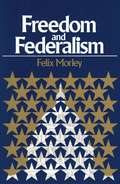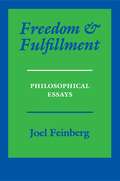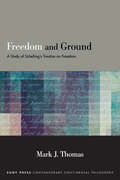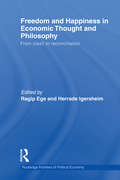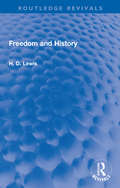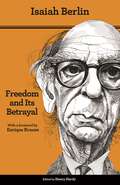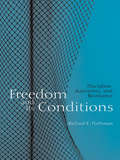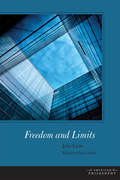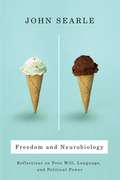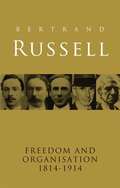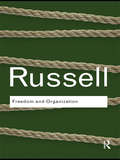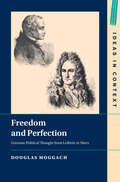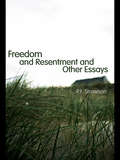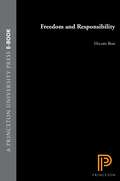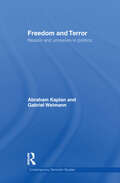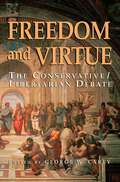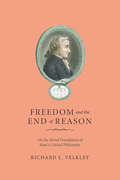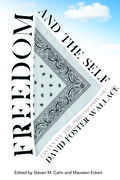- Table View
- List View
Freedom and Destiny
by Rollo May"May is an existential analyst who deservedly enjoys a reputation among both general and critical readers as an accessible and insightful social and psychological theorist. ... Freedom's characteristics, fruits, and problems; destiny's reality; death; and therapy's place in the confrontation between freedom and destiny are examined. ... Poets, social critics, artists, and other thinkers are invoked appropriately to support May's theory of freedom and destiny's interdependence."-Library Journal. "Especially instructive, even stunning, is Dr. May's willingness to respect mystery. ... There is, too, at work throughout the book a disciplined yet relaxed clinical mind, inclined to celebrate ... what Flannery O'Connor called 'mystery and manners,' and to do so in a tactful, meditative manner. "-Robert Coles, America.
Freedom and Discipline (Routledge Library Editions: Education)
by Richard SmithQuestions of discipline and order arise wherever formal education is practised, and are particularly acute for those training to teach or in their first school posts. For many years now writing on these topics has tended to depict teaching as the deployment of ‘skills’ and ‘techniques’ and competent teachers as those who successfully ‘manage’ their classes. This approach is criticised by Richard Smith as manipulative and destructive of the kind of pupil-teacher relationship conducive to any but the most trivial sorts of learning. Thus the philosophical issues which the book explores are shown throughout to have their roots in problems associated with established thinking and practice, and the author’s ideas have considerable practical relevance. He argues for a thorough reappraisal of the nature and basis of the teacher’s authority and demonstrates the importance of a proper understanding of the function of punishment. He suggests that many of the problems of discipline that teachers meet may actually stem from inappropriate ways of treating pupils, and shows that solutions to these problems must be compatible with the degree of initiative and personal responsibility that it is the business of education to foster. Schools have changed in many ways, largely for the better, since the first edition of this book appeared: the young people in them are generally treated with far more respect than was the case a quarter of a century ago. The voices of a more repressive tradition however still make themselves heard from time to time. It is therefore important continually to re-state the principles on which civilised relationships between pupils and teachers need to be based.
Freedom and Enforcement in Action
by Janusz CzelakowskiAction theory is the object of growing attention in a variety of scientific disciplines and this is the first volume to offer a synthetic view of the range of approaches possible in the topic. The volume focuses on the nexus of formal action theory with a startlingly diverse set of subjects, which range from logic, linguistics, artificial intelligence and automata theory to jurisprudence, deontology and economics. It covers semantic, mathematical and logical aspects of action, showing how the problem of action breaks the boundaries of traditional branches of logic located in syntactics and semantics and now lies on lies on the borderline between logical pragmatics and praxeology. The chapters here focus on specialized tasks in formal action theory, beginning with a thorough description and formalization of the language of action and moving through material on the differing models of action theory to focus on probabilistic models, the relations of formal action theory to deontic logic and its key applications in algorithmic and programming theory. The coverage thus fills a notable lacuna in the literary corpus and offers solid formal underpinning in cognitive science by approaching the problem of cognition as a composite action of mind.
Freedom and Equality: The Moral Basis of Democratic Socialism (Routledge Revivals)
by Keith DixonUnashamedly polemical, this reissue of Freedom & Equality, first published in 1986, presents a strong and persuasively argued case for democratic socialism. In contrast to many recent books justifying conservatism and varieties of Marxism, Keith Dixon defends the two great principles underpinning democratic socialism – freedom and equality. He aims both to restore the idea of freedom to its proper place in the political vocabulary of the left and to defend a stark version of freedom as absence of constraint. Only this version of freedom, he argues, is consistent with the proper defence of civil liberties. Dixon also defends radical egalitarianism from its critics, who either repudiate its full force or reject it out of hand. He believes that freedom and equality are potentially realizable socialist goals, that democratic socialism is not necessarily linked with fraternalism, and – above all – that it should be based upon a firm and consistent conception of individuality.
Freedom and Federalism
by Felix MorleyNo less relevant today, the book provides a perceptive diagnosis of the collapse of States' rights in modern America; and it seeks the restoration of a constitutional balance between central and state authorities.
Freedom and Fulfillment: Philosophical Essays
by Joel FeinbergDealing with a diverse set of problems in practical and theoretical ethics, these fourteen essays, three of them previously unpublished, reconfirm Joel Feinberg's leading position in the field of legal philosophy. With a clarity and humor that will be familiar to readers of his other works, Feinberg writes on topics including "wrongful life" suits in the law of torts, or whether there is any sense in the remark that a person is so badly off that he would be better off not existing at all; the morality of abortion; educational options; free expression; civil disobedience; and the duty of easy rescue in criminal law. He continues with a three-part defense of moral rights in the abstract, a discussion of voluntary euthanasia, and an inquiry into arguments of various kinds for not granting legal rights in enforcement of a person's acknowledged moral rights. This collection concludes with two essays dealing with concepts used in appraising the whole of a person's life: absurdity and self-fulfillment, and their interplay.
Freedom and Ground: A Study of Schelling's Treatise on Freedom (SUNY series in Contemporary Continental Philosophy)
by Mark J. ThomasThis book is a new interpretation of Schelling's path-breaking 1809 treatise on freedom, the last major work published during his lifetime. The treatise is at the heart of the current Schelling renaissance—indeed, Heidegger calls it "one of the most profound works of German, thus of Western, philosophy." It is also one of the most demanding and complex texts in German Idealism. By tracing the problem of ground through Schelling's treatise, Mark J. Thomas provides a unified reading of the text, while unlocking the meaning of its most challenging passages through clear, detailed analysis. He shows how Schelling's implicit distinction between senses of ground is the key to his project of constructing a system that can satisfy reason while accommodating objects that seem to defy rational explanation—including evil, the origins of nature, and absolute freedom. This allows Schelling to unite reason and mystery, providing a rich model for philosophizing about freedom and evil today.
Freedom and Happiness in Economic Thought and Philosophy: From Clash to Reconciliation (Routledge Frontiers Of Political Economy Ser. #147)
by Ragip Ege Herrade IgersheimStarting from a distinction made by the American philosopher, John Rawls, in 2000 between two kinds of liberalism, "liberalism of freedom" and "liberalism of happiness", this book presents a range of articles by economists and philosophers debating the most fundamental aspects of the subject. These include the exact significance of Rawls’ distinction and how it can be related to European political philosophy on the one hand and to utilitarianism on the other hand; the various definitions of happiness and freedom and their implications and the informational basis of individual preferences. The objectives of the book are twofold: first, it is devoted to a thorough analysis of the founding texts of both liberalisms. It aims to determine the logic of selection of the concepts which these traditions consider as relevant. The Kantian pair "Reasonable"/"Rational" can be seen as the basis on which these concepts are defined, our final concern being to reveal the profound relations of complementarity between them: we call it reconciliation. Secondly, we consider a fundamental issue of welfare economics – how to appraise individual preferences – in light of the Rawlsian distinction. It is emphasized that neither a criterion based on liberalism of freedom by itself, nor an evaluation in terms of liberalism of happiness by itself exhausts the question of utility. One must combine both aspects in order to cope with that issue. To do so, it is claimed that one can resort to the concept of metaranking of preferences. All the contributions included in this book are the outcomes of a collective research project of three years. The contributors come from a variety of backgrounds and yet are unified in developing a specific position about freedom and happiness. This book should be of interest to those focusing on the history of economic thought as well as moral, political and economic philosophy.
Freedom and History (Routledge Revivals)
by H. D. LewisFirst published in 1962, Freedom and History expresses a deep concern about freedom and the way it is imperilled by misunderstandings. The cause of freedom has not always been well served by its friends; by presenting one -sided ideas of freedom they have often paved the way for extreme forms of collectivism and despotism. Professor Lewis examines works of T.H. Green and compares Green with Locke and Rousseau, to show how much the attitude of Green and other idealists to questions of education, the family, punishment, slavery, and war was affected by the individualism that underlay their thought and the failure to pay due heed to the facts of moral perplexity. This in turn is seen to owe much to the optimism of late nineteenth century thinkers and the belief in inevitable progress. The volume also discusses the nature of history, objectivity in history, religion and history, and law and morality. Author subjects the works of writers like Reinhold Niebuhr, Barbara Wootton, Ian Ramsey, Leonard Hodgson to close critical examination and presents his own ideas about the relation of theology to historical fact. This book will be an essential read for scholars and researchers of political philosophy, religion, theology, ethics, moral philosophy, and philosophy in general.
Freedom and Its Betrayal: Six Enemies of Human Liberty - Updated Edition
by Isaiah BerlinThese celebrated lectures constitute one of Isaiah Berlin's most concise, accessible, and convincing presentations of his views on human freedom—views that later found expression in such famous works as "Two Concepts of Liberty" and were at the heart of his lifelong work on the Enlightenment and its critics. When they were broadcast on BBC radio in 1952, the lectures created a sensation and confirmed Berlin’s reputation as an intellectual who could speak to the public in an appealing and compelling way. A recording of only one of the lectures has survived, but Henry Hardy has recreated them all here from BBC transcripts and Berlin’s annotated drafts. Hardy has also added, as an appendix to this new edition, a revealing text of "Two Concepts" based on Berlin’s earliest surviving drafts, which throws light on some of the issues raised by the essay. And, in a new foreword, historian Enrique Krauze traces the origin of Berlin’s idea of negative freedom to his rejection of the notion that the creation of the State of Israel left Jews with only two choices: to emigrate to Israel or to renounce Jewish identity.
Freedom and Its Conditions: Discipline, Autonomy, and Resistance
by Richard FlathmanFirst published in 2003. Routledge is an imprint of Taylor & Francis, an informa company.
Freedom and Limits (American Philosophy)
by John LachsFreedom and Limits is a defense of the value of freedom in the context of human finitude. A contribution to the American tradition of philosophy, it focuses attention on moral problems as we encounter them in daily life, where the search for perfection and the incessant drive to meet obligations make it difficult to attain satisfaction. The book argues that uniformity is unproductive: Human natures are varied and changeable, making the effort to impose a unitary good on everyone futile. Moreover, we don’t need to strive for more than what is good enough: Finite achievements should be adequate to satisfy finite people.The ultimate aim of the book is to reclaim the role of philosophy as a guide to life. In doing so, it presents discussions of such important philosophers as Fichte, Hegel, Peirce, Dewey, James, and, above all, Santayana.
Freedom and Neurobiology: Reflections on Free Will, Language, and Political Power
by John R. SearleOur self-conception derives mostly from our own experience. We believe ourselves to be conscious, rational, social, ethical, language-using, political agents who possess free will. Yet we know we exist in a universe that consists of mindless, meaningless, unfree, nonrational, brute physical particles. How can we resolve the conflict between these two visions? In Freedom and Neurobiology, the philosopher John Searle discusses the possibility of free will within the context of contemporary neurobiology. He begins by explaining the relationship between human reality and the more fundamental reality as described by physics and chemistry. Then he proposes a neurobiological resolution to the problem by demonstrating how various conceptions of free will have different consequences for the neurobiology of consciousness. In the second half of the book, Searle applies his theory of social reality to the problem of political power, explaining the role of language in the formation of our political reality. The institutional structures that organize, empower, and regulate our lives-money, property, marriage, government-consist in the assignment and collective acceptance of certain statuses to objects and people. Whether it is the president of the United States, a twenty-dollar bill, or private property, these entities perform functions as determined by their status in our institutional reality. Searle focuses on the political powers that exist within these systems of status functions and the way in which language constitutes them. Searle argues that consciousness and rationality are crucial to our existence and that they are the result of the biological evolution of our species. He addresses the problem of free will within the context of a neurobiological conception of consciousness and rationality, and he addresses the problem of political power within the context of this analysis. A clear and concise contribution to the free-will debate and the study of cognition, Freedom and Neurobiology is essential reading for students and scholars of the philosophy of mind.
Freedom and Neurobiology: Reflections on Free Will, Language, and Political Power (Columbia Themes in Philosophy)
by John SearleOur self-conception derives mostly from our own experience. We believe ourselves to be conscious, rational, social, ethical, language-using, political agents who possess free will. Yet we know we exist in a universe that consists of mindless, meaningless, unfree, nonrational, brute physical particles. How can we resolve the conflict between these two visions?In Freedom and Neurobiology, the philosopher John Searle discusses the possibility of free will within the context of contemporary neurobiology. He begins by explaining the relationship between human reality and the more fundamental reality as described by physics and chemistry. Then he proposes a neurobiological resolution to the problem by demonstrating how various conceptions of free will have different consequences for the neurobiology of consciousness. In the second half of the book, Searle applies his theory of social reality to the problem of political power, explaining the role of language in the formation of our political reality. The institutional structures that organize, empower, and regulate our lives-money, property, marriage, government-consist in the assignment and collective acceptance of certain statuses to objects and people. Whether it is the president of the United States, a twenty-dollar bill, or private property, these entities perform functions as determined by their status in our institutional reality. Searle focuses on the political powers that exist within these systems of status functions and the way in which language constitutes them.Searle argues that consciousness and rationality are crucial to our existence and that they are the result of the biological evolution of our species. He addresses the problem of free will within the context of a neurobiological conception of consciousness and rationality, and he addresses the problem of political power within the context of this analysis. A clear and concise contribution to the free-will debate and the study of cognition, Freedom and Neurobiology is essential reading for students and scholars of the philosophy of mind.
Freedom and Organisation, 1814-1914
by Bertrand RussellThe purpose of this book is to trace the opposition and interaction of two main causes of change in the Nineteenth century: the belief in freedom which was common to Liberals and Radicals, and the necessity for organization which arose through industrial and scientific technique.' - Bertrand Russell A revealing account by one of the twentieth century's greatest minds, charting the struggle between two determining forces in nineteenth century history: freedom and control. Russell's text sweeps from the defeat of Napoleon and the Congress of Vienna to the lead up to the First World War. It is full of lively portraits, including Malthus, Mill, Bentham and Marx. Russell examines the founding of democracy in America and the struggle with slavery, and brings to life the ideas of Jefferson, Jackson and Lincoln.
Freedom and Organization (Routledge Classics)
by Bertrand RussellWritten by one of the twentieth century’s most significant thinkers, Freedom and Organization, is considered to be Bertrand Russell’s major work on political history. It traces the main causes of political change during a period of one hundred years, which he argues were predominantly influenced by three major elements – economic technique, political theory and certain significant individuals. In the witty, approachable style that has made Bertrand Russell’s works so revered, he explores in detail the major forces and events that shaped the nineteenth century.
Freedom and Perfection: German Political Thought from Leibniz to Marx (Ideas in Context)
by Douglas MoggachLeibniz, this study argues, is the genuine initiator of German Idealism. His analysis of freedom as spontaneity and the relations he establishes among freedom, justice, and progress underlie Kant's ideas of rightful interaction and his critiques of Enlightened absolutism. Freedom and Perfection offers a historical examination of perfectionism, its political implications and transformations in German thought between 1650 and 1850. Douglas Moggach demonstrates how Kant's followers elaborated a new ethical-political approach, 'post-Kantian perfectionism', which, in the context of the French Revolution, promoted the conditions for free activity rather than state-directed happiness. Hegel, the Hegelian School, and Marx developed this approach further with reference to the historical process as the history of freedom. Highlighting the decisive importance of Leibniz for subsequent theorists of the state, society, and economy, Freedom and Perfection offers a new interpretation of important schools of modern thought and a vantage point for contemporary political debates.
Freedom and Resentment and Other Essays
by P. F. StrawsonBy the time of his death in 2006, Sir Peter Strawson was regarded as one of the world's most distinguished philosophers. First published thirty years ago but long since unavailable, Freedom and Resentment collects some of Strawson's most important work and is an ideal introduction to his thinking on such topics as the philosophy of language, metaphysics, epistemology and aesthetics. Beginning with the title essay Freedom and Resentment, this invaluable collection is testament to the astonishing range of Strawson's thought as he discusses free will, ethics and morality, logic, the mind-body problem and aesthetics. The book is perhaps best-known for its three interrelated chapters on perception and the imagination, subjects now at the very forefront of philosophical research. This reissue includes a substantial new foreword by Paul Snowdon and a fascinating intellectual autobiography by Strawson.
Freedom and Responsibility
by Hilary BokCan we reconcile the idea that we are free and responsible agents with the idea that what we do is determined according to natural laws? For centuries, philosophers have tried in different ways to show that we can. Hilary Bok takes a fresh approach here, as she seeks to show that the two ideas are compatible by drawing on the distinction between practical and theoretical reasoning.Bok argues that when we engage in practical reasoning--the kind that involves asking "what should I do?" and sifting through alternatives to find the most justifiable course of action--we have reason to hold ourselves responsible for what we do. But when we engage in theoretical reasoning--searching for causal explanations of events--we have no reason to apply concepts like freedom and responsibility. Bok contends that libertarians' arguments against "compatibilist" justifications of moral responsibility fail because they describe human actions only from the standpoint of theoretical reasoning. To establish this claim, she examines which conceptions of freedom of the will and moral responsibility are relevant to practical reasoning and shows that these conceptions are not vulnerable to many objections that libertarians have directed against compatibilists. Bok concludes that the truth or falsity of the claim that we are free and responsible agents in the sense those conceptions spell out is ultimately independent of deterministic accounts of the causes of human actions.Clearly written and powerfully argued, Freedom and Responsibility is a major addition to current debate about some of philosophy's oldest and deepest questions.
Freedom and Terror: Reason and Unreason in Politics (Contemporary Terrorism Studies)
by Gabriel Weimann Abraham KaplanThis book examines reason and unreason in the legal and political responses to terrorism. Terrorism is often perceived as sheer madness, unreasonable use of extreme violence and senseless, futile political action. These assertions are challenged by this book. Combining ‘traditional’ thought (by Kaplan) on reason and unreason in terrorism with empirical explorations of post-modern terrorism and its use of communication platforms (by Weimann) the work uses interdisciplinary and cross disciplinary dimensions to provide a multidimensional picture of critical issues in current politics and a deeper examination of their implications than previously available. The book looks at various aspects of modern politics, from terrorism to protest, from decision-making to political discourse, applying the perspective of philosophical thought. To do so, political issues and actions are examined by using concepts such as reason, emotions, madness, magic, morality, absolutism, extremism, psychopathology, rationality and others. The analysis is rooted in theories and concepts derived from history, philosophy, religion, art, sociology, psychology, and political science. This book, which was mostly written by the late Abraham Kaplan, an American philosopher, and edited and updated by Gabriel Weimann, will be of much interest to students of political violence/terrorism, philosophy, war and conflict studies and political science in general.
Freedom and Virtue: The Conservative Libertarian Debate
by George W. CareyThe long-running debates between between conservatives and libertarians are vigorous and highly charged, dealing with ideas about the very nature of liberty and morality. Like no other single work, Freedom and Virtue explores what unites and divides the adherents of these two important American traditions—shedding much light on our current political landscape.
Freedom and the End of Reason: On the Moral Foundation of Kant's Critical Philosophy
by Richard L. VelkleyIn Freedom and the End of Reason, Richard L. Velkley offers an influential interpretation of the central issue of Kant’s philosophy and an evaluation of its position within modern philosophy’s larger history. He persuasively argues that the whole of Kantianism#151;not merely the Second Critique#151;focuses on a #147;critique of practical reason” and is a response to a problem that Kant saw as intrinsic to reason itself: the teleological problem of its goodness. Reconstructing the influence of Rousseau on Kant’s thought, Velkley demonstrates that the relationship between speculative philosophy and practical philosophy in Kant is far more intimate than generally has been perceived. By stressing a Rousseau-inspired notion of reason as a provider of practical ends, he is able to offer an unusually complete account of Kant’s idea of moral culture.
Freedom and the Pursuit of Happiness
by Sebastiano Bavetta Pietro Navarra Dario MaimoneThis book is about the relationship between different concepts of freedom and happiness. The book's authors distinguish three concepts for which an empirical measure exists: opportunity to choose (negative freedom), capability to choose (positive freedom), and autonomy to choose (autonomy freedom). They also provide a comprehensive account of the relationship between freedom and well-being by comparing channels through which freedoms affect quality of life. The book also explores whether the different conceptions of freedom complement or replace each other in the determination of the level of well-being. In so doing, the authors make freedoms a tool for policy making and are able to say which conception is the most effective for well-being, as circumstances change. The results have implications for a justification of a free society: maximizing freedoms is good for its favorable consequences upon individual well-being, a fundamental value for the judgment of human advantage.
Freedom and the Self
by Steven M. Cahn Maureen EckertThe book Fate, Time, and Language: An Essay on Free Will, published in 2010 by Columbia University Press, presented David Foster Wallace's challenge to Richard Taylor's argument for fatalism. In this anthology, notable philosophers engage directly with that work and assess Wallace's reply to Taylor as well as other aspects of Wallace's thought.With an introduction by Steven M. Cahn and Maureen Eckert, this collection includes essays by William Hasker (Huntington University), Gila Sher (University of California, San Diego), Marcello Oreste Fiocco (University of California, Irvine), Daniel R. Kelly (Purdue University), Nathan Ballantyne (Fordham University), Justin Tosi (University of Arizona), and Maureen Eckert. These thinkers explore Wallace's philosophical and literary work, illustrating remarkable ways in which his philosophical views influenced and were influenced by themes developed in his other writings, both fictional and nonfictional. Together with Fate, Time, and Language, this critical set unlocks key components of Wallace's work and its traces in modern literature and thought.
Freedom and the Self: Essays on the Philosophy of David Foster Wallace
by Steven M. Cahn Eckert MaureenThe book Fate, Time, and Language: An Essay on Free Will, published in 2010 by Columbia University Press, presented David Foster Wallace's challenge to Richard Taylor's argument for fatalism. In this anthology, notable philosophers engage directly with that work and assess Wallace's reply to Taylor as well as other aspects of Wallace's thought.With an introduction by Steven M. Cahn and Maureen Eckert, this collection includes essays by William Hasker (Huntington University), Gila Sher (University of California, San Diego), Marcello Oreste Fiocco (University of California, Irvine), Daniel R. Kelly (Purdue University), Nathan Ballantyne (Fordham University), Justin Tosi (University of Arizona), and Maureen Eckert. These thinkers explore Wallace's philosophical and literary work, illustrating remarkable ways in which his philosophical views influenced and were influenced by themes developed in his other writings, both fictional and nonfictional. Together with Fate, Time, and Language, this critical set unlocks key components of Wallace's work and its traces in modern literature and thought.
